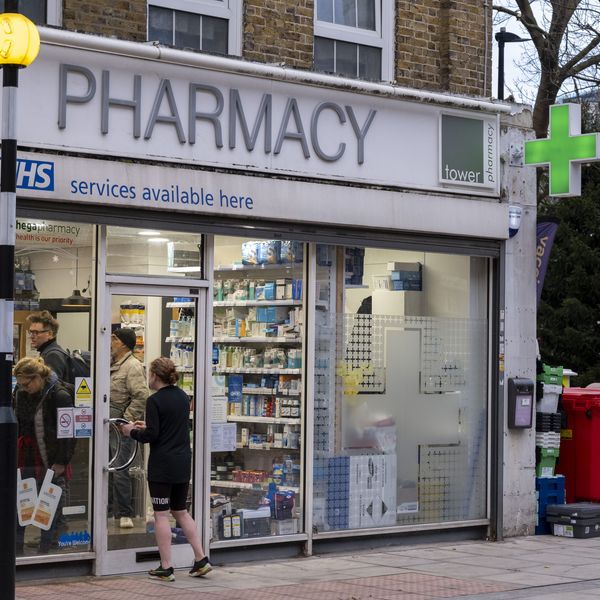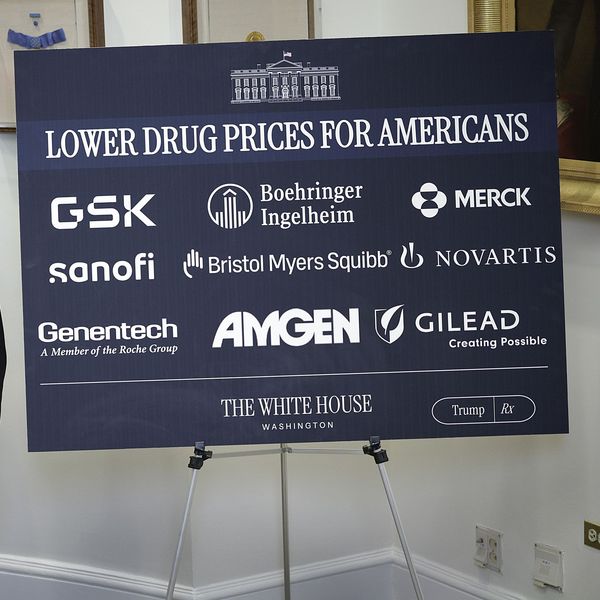Pharmaceutical Extortion: Pay Up, or Die
Group of global cancer experts criticizes exorbitant drug costs that prevent access to life-saving treatments
A group of cancer experts has issued a searing indictment of the "free market economy" principles that allow pharmaceutical companies to reap enormous profits while patients remain hostages to the industry, forced to either pay high drug prices or lose their lives.
In an editorial in Blood, the journal of the American Society of Hematology, over 100 leukemia experts from around the world argue that
Unaffordable drug prices in CML [chronic myelogenous leukemia] may be preventing many patients from accessing these life-saving drugs. [...]
Grateful patients may have become the "financial victims" of the treatment success, having to pay the high price annually to stay alive.
The prices are too high and ultimately "harmful to the sustainability of our national healthcare systems," they write.
While their focus is on CML drugs, the group writes that their findings are indicative of the "spiraling prices of cancer drugs in general." For example, 11 of the 12 cancer-treating drugs the FDA approved in 2012 were priced above $100,000 per year.
A case in point is the drug imatinib, sold by Novartis under the name Glivec, which provided about $4.7 billion in annual revenues in 2012.
The experts write that it was priced at nearly $30,000 per year in 2001 but skyrocketed to $92,000 per year in 2012, even though the original price already included research costs, "new indications were developed and FDA approved," and more people were taking it. Imatinib, they write, "may have set the pace for the rising cost of cancer drugs."
The authors conclude that the Hippocratic Oath of "do no harm" they took compels them to argue against the high prices of these drugs that do harm to and may risk the lives of cancer patients.
_________________________
An Urgent Message From Our Co-Founder
Dear Common Dreams reader, The U.S. is on a fast track to authoritarianism like nothing I've ever seen. Meanwhile, corporate news outlets are utterly capitulating to Trump, twisting their coverage to avoid drawing his ire while lining up to stuff cash in his pockets. That's why I believe that Common Dreams is doing the best and most consequential reporting that we've ever done. Our small but mighty team is a progressive reporting powerhouse, covering the news every day that the corporate media never will. Our mission has always been simple: To inform. To inspire. And to ignite change for the common good. Now here's the key piece that I want all our readers to understand: None of this would be possible without your financial support. That's not just some fundraising cliche. It's the absolute and literal truth. We don't accept corporate advertising and never will. We don't have a paywall because we don't think people should be blocked from critical news based on their ability to pay. Everything we do is funded by the donations of readers like you. Will you donate now to help power the nonprofit, independent reporting of Common Dreams? Thank you for being a vital member of our community. Together, we can keep independent journalism alive when it’s needed most. - Craig Brown, Co-founder |
A group of cancer experts has issued a searing indictment of the "free market economy" principles that allow pharmaceutical companies to reap enormous profits while patients remain hostages to the industry, forced to either pay high drug prices or lose their lives.
In an editorial in Blood, the journal of the American Society of Hematology, over 100 leukemia experts from around the world argue that
Unaffordable drug prices in CML [chronic myelogenous leukemia] may be preventing many patients from accessing these life-saving drugs. [...]
Grateful patients may have become the "financial victims" of the treatment success, having to pay the high price annually to stay alive.
The prices are too high and ultimately "harmful to the sustainability of our national healthcare systems," they write.
While their focus is on CML drugs, the group writes that their findings are indicative of the "spiraling prices of cancer drugs in general." For example, 11 of the 12 cancer-treating drugs the FDA approved in 2012 were priced above $100,000 per year.
A case in point is the drug imatinib, sold by Novartis under the name Glivec, which provided about $4.7 billion in annual revenues in 2012.
The experts write that it was priced at nearly $30,000 per year in 2001 but skyrocketed to $92,000 per year in 2012, even though the original price already included research costs, "new indications were developed and FDA approved," and more people were taking it. Imatinib, they write, "may have set the pace for the rising cost of cancer drugs."
The authors conclude that the Hippocratic Oath of "do no harm" they took compels them to argue against the high prices of these drugs that do harm to and may risk the lives of cancer patients.
_________________________
A group of cancer experts has issued a searing indictment of the "free market economy" principles that allow pharmaceutical companies to reap enormous profits while patients remain hostages to the industry, forced to either pay high drug prices or lose their lives.
In an editorial in Blood, the journal of the American Society of Hematology, over 100 leukemia experts from around the world argue that
Unaffordable drug prices in CML [chronic myelogenous leukemia] may be preventing many patients from accessing these life-saving drugs. [...]
Grateful patients may have become the "financial victims" of the treatment success, having to pay the high price annually to stay alive.
The prices are too high and ultimately "harmful to the sustainability of our national healthcare systems," they write.
While their focus is on CML drugs, the group writes that their findings are indicative of the "spiraling prices of cancer drugs in general." For example, 11 of the 12 cancer-treating drugs the FDA approved in 2012 were priced above $100,000 per year.
A case in point is the drug imatinib, sold by Novartis under the name Glivec, which provided about $4.7 billion in annual revenues in 2012.
The experts write that it was priced at nearly $30,000 per year in 2001 but skyrocketed to $92,000 per year in 2012, even though the original price already included research costs, "new indications were developed and FDA approved," and more people were taking it. Imatinib, they write, "may have set the pace for the rising cost of cancer drugs."
The authors conclude that the Hippocratic Oath of "do no harm" they took compels them to argue against the high prices of these drugs that do harm to and may risk the lives of cancer patients.
_________________________

